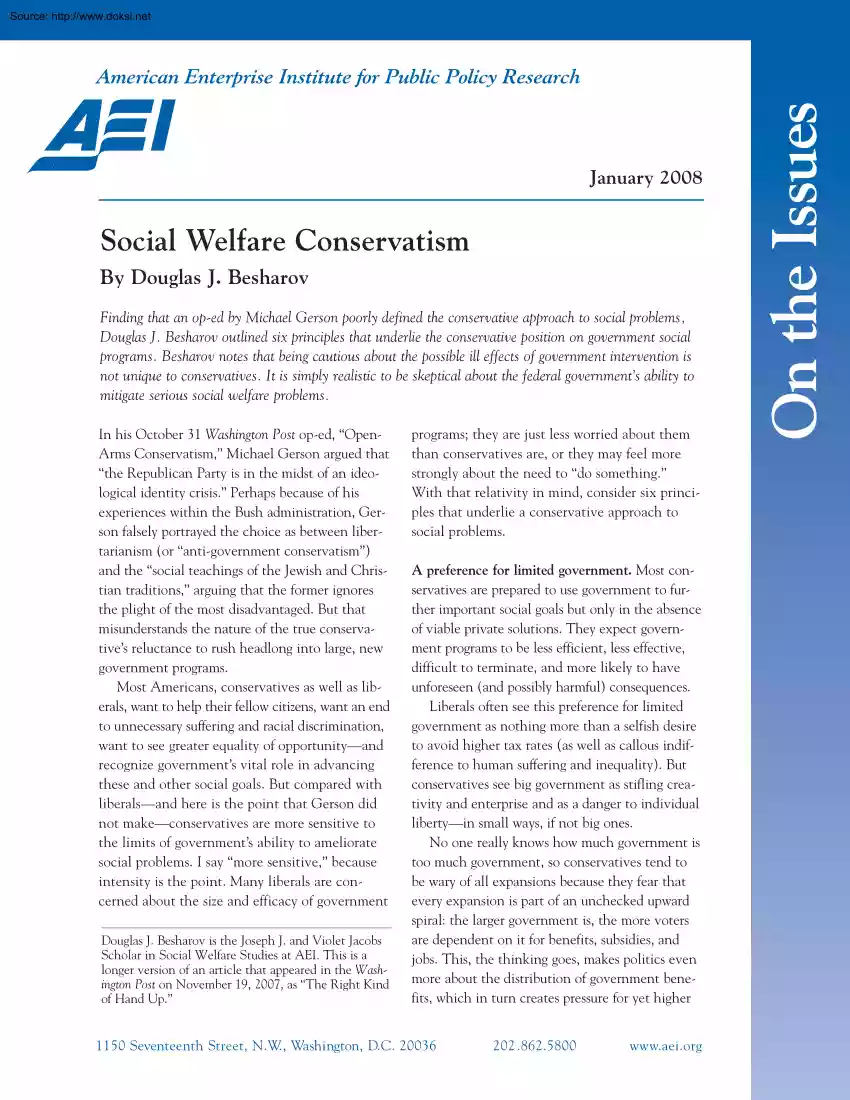A doksi online olvasásához kérlek jelentkezz be!

A doksi online olvasásához kérlek jelentkezz be!
Nincs még értékelés. Legyél Te az első!
Mit olvastak a többiek, ha ezzel végeztek?
Tartalmi kivonat
January 2008 Social Welfare Conservatism By Douglas J. Besharov Finding that an op-ed by Michael Gerson poorly defined the conservative approach to social problems, Douglas J. Besharov outlined six principles that underlie the conservative position on government social programs. Besharov notes that being cautious about the possible ill effects of government intervention is not unique to conservatives. It is simply realistic to be skeptical about the federal government’s ability to mitigate serious social welfare problems. In his October 31 Washington Post op-ed, “OpenArms Conservatism,” Michael Gerson argued that “the Republican Party is in the midst of an ideological identity crisis.” Perhaps because of his experiences within the Bush administration, Gerson falsely portrayed the choice as between libertarianism (or “anti-government conservatism”) and the “social teachings of the Jewish and Christian traditions,” arguing that the former ignores the plight of the most
disadvantaged. But that misunderstands the nature of the true conservative’s reluctance to rush headlong into large, new government programs. Most Americans, conservatives as well as liberals, want to help their fellow citizens, want an end to unnecessary suffering and racial discrimination, want to see greater equality of opportunityand recognize government’s vital role in advancing these and other social goals. But compared with liberalsand here is the point that Gerson did not makeconservatives are more sensitive to the limits of government’s ability to ameliorate social problems. I say “more sensitive,” because intensity is the point. Many liberals are concerned about the size and efficacy of government Douglas J. Besharov is the Joseph J and Violet Jacobs Scholar in Social Welfare Studies at AEI. This is a longer version of an article that appeared in the Washington Post on November 19, 2007, as “The Right Kind of Hand Up.” programs; they are just less worried about
them than conservatives are, or they may feel more strongly about the need to “do something.” With that relativity in mind, consider six principles that underlie a conservative approach to social problems. A preference for limited government. Most conservatives are prepared to use government to further important social goals but only in the absence of viable private solutions. They expect government programs to be less efficient, less effective, difficult to terminate, and more likely to have unforeseen (and possibly harmful) consequences. Liberals often see this preference for limited government as nothing more than a selfish desire to avoid higher tax rates (as well as callous indifference to human suffering and inequality). But conservatives see big government as stifling creativity and enterprise and as a danger to individual libertyin small ways, if not big ones. No one really knows how much government is too much government, so conservatives tend to be wary of all expansions
because they fear that every expansion is part of an unchecked upward spiral: the larger government is, the more voters are dependent on it for benefits, subsidies, and jobs. This, the thinking goes, makes politics even more about the distribution of government benefits, which in turn creates pressure for yet higher 1150 Seventeenth Street, N.W, Washington, DC 20036 202 .8625800 www.aeiorg On the Issues Source: http://www.doksinet Source: http://www.doksinet -2taxes and yet more government. As Winston Churchill once wrote, probably borrowing from Sir Alexander Tytler, the eighteenth-century Scottish historian: “A democracy cannot exist as a permanent form of government. It can only exist until the voters discover that they can vote themselves largesse from the public treasury.”1 A desire to means-test or otherwise target government benefits. Wariness about universal programs is a corollary of limited government and low taxes The argument in favor of universal programs and
against means-testing is, crudely, that only if the middle class is hooked on the program will there be sufficient political support for it. Richard Titmuss, the British social researcher, argued that “separate discriminatory services for poor people have always tended to be poor quality services.”2 Perhapsbut this is one of those widely repeated political axioms with little or no actual evidence supporting it. Compared to universal social welfare programs such as Social Security and Medicaretargeted programs are much less expensive and, if properly focused, can do as much and perhaps more good. Too often, programs that seek to serve both the middle class and the poor do a poor job serving the poor. Student aid is a good example of this: costs have skyrocketed and benefits have shrunk because of the great cost of serving so many nonpoor students. A concern about the behavioral consequences of assistance. Conservatives believe that no-strings-attached assistance has often been a
catastrophecreating even more dependency and a fertile ground for social problems. Again, it is not that liberals are oblivious to such concerns, it is just that they are more worried about leaving someone out of the social safety net than they are about increasing levels of dependence. Thus, most conservatives are happy with the tough strictures of the 1996 welfare reform law, but when the law was up for reauthorization, many liberals pushed for various exceptions to work requirements and to the fiveyear time limit on benefits. A deference to mediating institutions. These days, everyone seems eager to harness the energiesand legitimacyof family, neighborhood, church, and other societal groupings for this or that social priority. These are the voluntary associations that are the glue of society. Edmund Burke called them society’s “little platoons.”3 The key word here is “deference.” Deference means letting mediating institutions do it “their way,” in programming, in
staffing, in their tendency to be judgmental, and even in their reliance on religious faith. Too many people (on the left and the right) want to use mediating institutions to further government’s objectives, in government’s way. Too often, programs that seek to serve both the middle class and the poor do a poor job serving the poor. A former head of a Catholic charities agency once complained to me: “Government funding does not help us to do what we want to do. It just gets us to add our own money to what the government wants us to do. And then they tell us how to do it.” We should appreciate mediating institutions for what they seem to accomplishwithout changing them into institutions that might be much less effective. Of course, there is a limit to what private institutions should be allowed to do with public funds, but conservatism starts with greater initial respect for the institution’s own way of doing things. Respect for private choice, often in the form of markets.
Conservatives have great faith in the ability of individualsincluding the poorto make sound decisions about their lives. How many times do we hear it said, for example, that poor mothersall mothers, actuallycannot be trusted to choose good child care for their children? That is why advocates push for the heavy regulation of child care, even though that dim view of parental judgment has been proven wrong by the successful use of child-care vouchers, a federal guarantee since 1992. Private choice is a value in itself, but it does so much more. When properly channeled, the individual choices of thousands about the services they receive translate into market forces many times more efficientand less politicalthan the top-down decision-making that characterizes most current programming. Notice that I have said nothing about school vouchers. That is because, like a true conservative, I would like to see a lot more experience (and rigorous evaluation) before we take the final plunge into
full-scale implementation. We should give them a fair test, but it should be just thata test. And that brings me to my final point Source: http://www.doksinet -3Humility bred from disappointing experiencesand the likelihood of unintended consequences. Here the lines get blurry. Many political conservatives are anything but humble about their social policy ideas, while many liberals display a healthy skepticism about overly ambitious designs. So, perhaps this principle refers to “conservatives” with a very small “c.” The plain fact is that contemporary social welfare efforts are strewn with programmatic failures, unintended consequences, and just plain damage to individuals, neighborhoods, and, yes, even whole cities. The plain fact is that contemporary social welfare efforts are strewn with programmatic failures, unintended consequences, and just plain damage to individuals, neighborhoods, and, yes, even whole cities. It took more than a generation, for example, for
downtown New Haven to recover from the federal government’s catastrophic urban renewal programs of the 1960s. A humility of purpose and design should permeate social planning. When a problem seems bad enough, people often want to “do something,” even if the remedy is unproven or unlikely to succeed. Being conservative sometimes means seeing problems and deciding that nothing can be doneat least not immediately. That should not be the end of the inquiry. Being conservative includes a commitment to experimentationeven with ideas with which one does not agreecoupled with rigorous and honest evaluation. One additional point about experimentation: in our constitutional system, humility of design includes a general, but rebuttable, preference for state action over federal action. It is simply easier to correct past mistakes in a state capital than it is in Washington. I have labeled these six principles “conservative,” but, actually, they are relevant to any sound social
policymakingmade from either the left or the right. One does not have to be a conservative to be wary of unrealistic goals and the possible ill effects of government intervention. Remember the “tough liberals” of the Kennedy administration? Notes 1. Alexander Tytler, Cycle of Democracy (1770) 2. Richard M Titmuss, Commitment to Welfare (London: George Allen and Unwin, 1968), 134. 3. Edmund Burke, Reflections on the Revolution in France (London: Printed for J. Dodsley, 1791), 68 2008-06 #22576
disadvantaged. But that misunderstands the nature of the true conservative’s reluctance to rush headlong into large, new government programs. Most Americans, conservatives as well as liberals, want to help their fellow citizens, want an end to unnecessary suffering and racial discrimination, want to see greater equality of opportunityand recognize government’s vital role in advancing these and other social goals. But compared with liberalsand here is the point that Gerson did not makeconservatives are more sensitive to the limits of government’s ability to ameliorate social problems. I say “more sensitive,” because intensity is the point. Many liberals are concerned about the size and efficacy of government Douglas J. Besharov is the Joseph J and Violet Jacobs Scholar in Social Welfare Studies at AEI. This is a longer version of an article that appeared in the Washington Post on November 19, 2007, as “The Right Kind of Hand Up.” programs; they are just less worried about
them than conservatives are, or they may feel more strongly about the need to “do something.” With that relativity in mind, consider six principles that underlie a conservative approach to social problems. A preference for limited government. Most conservatives are prepared to use government to further important social goals but only in the absence of viable private solutions. They expect government programs to be less efficient, less effective, difficult to terminate, and more likely to have unforeseen (and possibly harmful) consequences. Liberals often see this preference for limited government as nothing more than a selfish desire to avoid higher tax rates (as well as callous indifference to human suffering and inequality). But conservatives see big government as stifling creativity and enterprise and as a danger to individual libertyin small ways, if not big ones. No one really knows how much government is too much government, so conservatives tend to be wary of all expansions
because they fear that every expansion is part of an unchecked upward spiral: the larger government is, the more voters are dependent on it for benefits, subsidies, and jobs. This, the thinking goes, makes politics even more about the distribution of government benefits, which in turn creates pressure for yet higher 1150 Seventeenth Street, N.W, Washington, DC 20036 202 .8625800 www.aeiorg On the Issues Source: http://www.doksinet Source: http://www.doksinet -2taxes and yet more government. As Winston Churchill once wrote, probably borrowing from Sir Alexander Tytler, the eighteenth-century Scottish historian: “A democracy cannot exist as a permanent form of government. It can only exist until the voters discover that they can vote themselves largesse from the public treasury.”1 A desire to means-test or otherwise target government benefits. Wariness about universal programs is a corollary of limited government and low taxes The argument in favor of universal programs and
against means-testing is, crudely, that only if the middle class is hooked on the program will there be sufficient political support for it. Richard Titmuss, the British social researcher, argued that “separate discriminatory services for poor people have always tended to be poor quality services.”2 Perhapsbut this is one of those widely repeated political axioms with little or no actual evidence supporting it. Compared to universal social welfare programs such as Social Security and Medicaretargeted programs are much less expensive and, if properly focused, can do as much and perhaps more good. Too often, programs that seek to serve both the middle class and the poor do a poor job serving the poor. Student aid is a good example of this: costs have skyrocketed and benefits have shrunk because of the great cost of serving so many nonpoor students. A concern about the behavioral consequences of assistance. Conservatives believe that no-strings-attached assistance has often been a
catastrophecreating even more dependency and a fertile ground for social problems. Again, it is not that liberals are oblivious to such concerns, it is just that they are more worried about leaving someone out of the social safety net than they are about increasing levels of dependence. Thus, most conservatives are happy with the tough strictures of the 1996 welfare reform law, but when the law was up for reauthorization, many liberals pushed for various exceptions to work requirements and to the fiveyear time limit on benefits. A deference to mediating institutions. These days, everyone seems eager to harness the energiesand legitimacyof family, neighborhood, church, and other societal groupings for this or that social priority. These are the voluntary associations that are the glue of society. Edmund Burke called them society’s “little platoons.”3 The key word here is “deference.” Deference means letting mediating institutions do it “their way,” in programming, in
staffing, in their tendency to be judgmental, and even in their reliance on religious faith. Too many people (on the left and the right) want to use mediating institutions to further government’s objectives, in government’s way. Too often, programs that seek to serve both the middle class and the poor do a poor job serving the poor. A former head of a Catholic charities agency once complained to me: “Government funding does not help us to do what we want to do. It just gets us to add our own money to what the government wants us to do. And then they tell us how to do it.” We should appreciate mediating institutions for what they seem to accomplishwithout changing them into institutions that might be much less effective. Of course, there is a limit to what private institutions should be allowed to do with public funds, but conservatism starts with greater initial respect for the institution’s own way of doing things. Respect for private choice, often in the form of markets.
Conservatives have great faith in the ability of individualsincluding the poorto make sound decisions about their lives. How many times do we hear it said, for example, that poor mothersall mothers, actuallycannot be trusted to choose good child care for their children? That is why advocates push for the heavy regulation of child care, even though that dim view of parental judgment has been proven wrong by the successful use of child-care vouchers, a federal guarantee since 1992. Private choice is a value in itself, but it does so much more. When properly channeled, the individual choices of thousands about the services they receive translate into market forces many times more efficientand less politicalthan the top-down decision-making that characterizes most current programming. Notice that I have said nothing about school vouchers. That is because, like a true conservative, I would like to see a lot more experience (and rigorous evaluation) before we take the final plunge into
full-scale implementation. We should give them a fair test, but it should be just thata test. And that brings me to my final point Source: http://www.doksinet -3Humility bred from disappointing experiencesand the likelihood of unintended consequences. Here the lines get blurry. Many political conservatives are anything but humble about their social policy ideas, while many liberals display a healthy skepticism about overly ambitious designs. So, perhaps this principle refers to “conservatives” with a very small “c.” The plain fact is that contemporary social welfare efforts are strewn with programmatic failures, unintended consequences, and just plain damage to individuals, neighborhoods, and, yes, even whole cities. The plain fact is that contemporary social welfare efforts are strewn with programmatic failures, unintended consequences, and just plain damage to individuals, neighborhoods, and, yes, even whole cities. It took more than a generation, for example, for
downtown New Haven to recover from the federal government’s catastrophic urban renewal programs of the 1960s. A humility of purpose and design should permeate social planning. When a problem seems bad enough, people often want to “do something,” even if the remedy is unproven or unlikely to succeed. Being conservative sometimes means seeing problems and deciding that nothing can be doneat least not immediately. That should not be the end of the inquiry. Being conservative includes a commitment to experimentationeven with ideas with which one does not agreecoupled with rigorous and honest evaluation. One additional point about experimentation: in our constitutional system, humility of design includes a general, but rebuttable, preference for state action over federal action. It is simply easier to correct past mistakes in a state capital than it is in Washington. I have labeled these six principles “conservative,” but, actually, they are relevant to any sound social
policymakingmade from either the left or the right. One does not have to be a conservative to be wary of unrealistic goals and the possible ill effects of government intervention. Remember the “tough liberals” of the Kennedy administration? Notes 1. Alexander Tytler, Cycle of Democracy (1770) 2. Richard M Titmuss, Commitment to Welfare (London: George Allen and Unwin, 1968), 134. 3. Edmund Burke, Reflections on the Revolution in France (London: Printed for J. Dodsley, 1791), 68 2008-06 #22576




 Jellemzően a vállalkozás beindítása előtt elkészített tanulmány, de készülhet már meglévő vállalkozás esetében is. Az üzleti tervezés egy olyan tervezési módszer, amely keretet a cég céljainak eléréséhez. Írásunk módszertani útmutatóként szolgál azoknak, akik érdeklődnek az üzleti tervezés iránt.
Jellemzően a vállalkozás beindítása előtt elkészített tanulmány, de készülhet már meglévő vállalkozás esetében is. Az üzleti tervezés egy olyan tervezési módszer, amely keretet a cég céljainak eléréséhez. Írásunk módszertani útmutatóként szolgál azoknak, akik érdeklődnek az üzleti tervezés iránt.